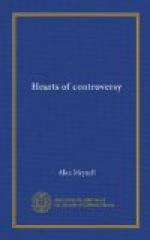Compare with such luxurious canterings the graver movement of this “Vision of Spring in Winter”:
Sunrise it sees not, neither set
of star,
Large nightfall, nor imperial plenilune,
Nor strong sweet shape of the full-breasted
noon;
But where the silver-sandalled shadows
are,
Too soft for arrows of the sun to
mar,
Moves with the mild gait of an ungrown
moon.
Even more valuable than this exquisite rhymed stanza is the blank verse which Swinburne released into new energies, new liberties, and new movements. Milton, it need hardly be said, is the master of those who know how to place and displace the stress and accent of the English heroic line in epic poetry. His most majestic hand undid the mechanical bonds of the national line and made it obey the unwritten laws of his genius. His blank verse marches, pauses, lingers, and charges. It feels the strain, it yields, it resists; it is all-expressive. But if the practice of some of the poets succeeding him had tended to make it rigid and tame again, Swinburne was a new liberator. He writes, when he ought, with a finely appropriate regularity, as in the lovely line on the forest glades
That fear the faun’s and know the dryad’s foot,
in which the rule is completely kept, every step of the five stepping from the unaccented place to the accented without a tremor. (I must again protest that I use the word “accent” in a sense that has come to be adapted to English prosody, because it is so used by all writers on English metre, and is therefore understood by the reader, but I think “stress” the better word.) But having written this perfect English-iambic line so wonderfully fit for the sensitive quiet of the woods, he turns the page to the onslaught of such lines—heroic lines with a difference—as report the short-breathed messenger’s reply to Althea’s question by whose hands the boar of Calydon had died:
A maiden’s and a prophet’s and thy son’s.
It is lamentable that in his latest blank verse Swinburne should have made a trick and a manner of that most energetic device of his by which he leads the line at a rush from the first syllable to the tenth, and on to the first of the line succeeding, with a great recoil to follow, as though a rider brought a horse to his haunches. It is in the same boar hunt:
And fiery with invasive eyes,
And bristling with intolerable hair,
Plunged;—
Sometimes we may be troubled with a misgiving that Swinburne’s fine narrative, as well as his descriptive writing of other kinds, has a counterpart in the programme-music of some now bygone composers. It is even too descriptive, too imitative of things, and seems to out-run the province of words, somewhat as that did the province of notes. But, though this hunting, and checking, and floating, and flying in metre may be to strain the arts of prosody and diction, with




